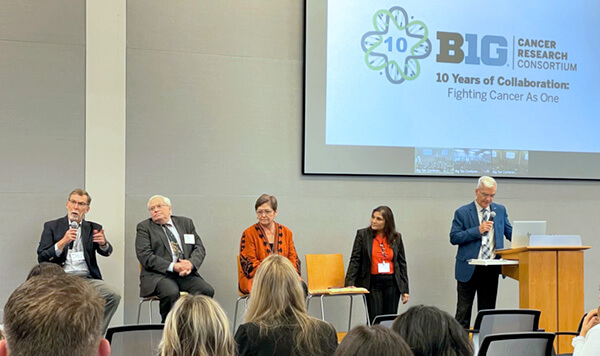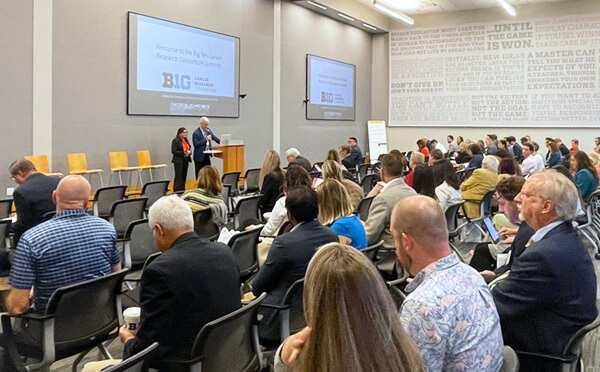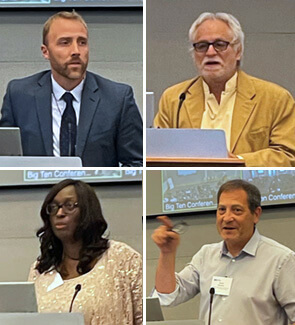December 3, 2023:
Bringing the best ideas forward, pulling expertise across cancer centers, connecting through mentorships, and ensuring racial, ethnic and gender diversity in clinical trial participation are critical components of the Big Ten Cancer Research Consortium (Big Ten CRC), according to Chief Scientific Officer Monika Joshi, MD, MRCP, from the Penn State Cancer Institute, who spoke at the Big Ten CRC Summit 2023, which brought together more than 110 researchers, investigators, cancer centers, and industry participants.
 This year’s event celebrated “Ten Years of Collaboration” for the Consortium with a kick-off panel of of founders and current leadership, including Howard Bailey, MD, chair of Big Ten CRC Cancer Center Directors from University of Wisconsin Carbone Cancer Center; Karen Dutcher, JD, Big Ten CRC Administrative Headquarters and general counsel at the Hoosier Cancer Research Network; Raymond J. Hohl, MD, PhD, from the Penn State Cancer Institute; Dr. Joshi; and George Weiner, MD, from the University of Iowa.
This year’s event celebrated “Ten Years of Collaboration” for the Consortium with a kick-off panel of of founders and current leadership, including Howard Bailey, MD, chair of Big Ten CRC Cancer Center Directors from University of Wisconsin Carbone Cancer Center; Karen Dutcher, JD, Big Ten CRC Administrative Headquarters and general counsel at the Hoosier Cancer Research Network; Raymond J. Hohl, MD, PhD, from the Penn State Cancer Institute; Dr. Joshi; and George Weiner, MD, from the University of Iowa.
Together, the Big Ten CRC institutions support more than 3,000 researchers among 15 academic institutions, care for more than 75,000 cancer patients, and enroll more than 30,000 participants in clinical trials.
In addition, to the vast resources and scientific milestones, the panel underscored the importance of mentorships among the Consortium. Co-founder Dr. Weiner said the ability for people to have mentors across research institutions is “one of the prime aspects that has paid off really well.”
“Junior investigators interact with senior investigators.” Weiner continued, “There are no red shirts,” referring to the NCAA’s policy to allow for athletes to not participate in games for a year of their eligibility for various reasons.
There also was some discussion on the expansion of the Big Ten Conference and how that may impact the Big Ten CRC.
Citing that the new institutions also have strong research programs, Dr. Joshi said, “It’s yet another opportunity for basic science researchers to participate … capturing the populations is going to add a lot to the consortium.”
 Dutcher agreed: “It’s a shot in the arm for new institutions to join, and creates more enthusiasm.”
Dutcher agreed: “It’s a shot in the arm for new institutions to join, and creates more enthusiasm.”
Access to more researchers and a more diverse patient population has been a primary tenet of the Big Ten CRC. Coral Omene, MD, PhD, from Rutgers Cancer Institute of New Jersey provided some updates on the work that she and the Diversity Committee have been pursuing. “We are trying to achieve equity across all groups, and we want to ensure that in our Consortium we are intentionally striving to do that. Everyone is like-minded with their intentions.”
The Big Ten CRC “allows us to do things we couldn’t do otherwise and allows us to provide access to clinical trials to patients that wouldn’t have otherwise,” reiterated Dr. Weiner.
Dr. Hohl noted that “taking advantage of our expertise brings an enhanced diversity of subjects for clinical trials; when we look at the Big Ten institutions, each of us has unique populations and groups that have been disadvantaged and not offered clinical trials.”
“The sum of the parts is much larger than the individual.”
SUMMIT SNAPSHOTS

Among the presenters during the Big Ten CRC Summit were (clockwise from top left) Greg Durm, MD; Ed Greenfield, PhD, David Dickens, MD, FAAP; and Coral Omene, MD, PhD
- Greg Durm, MD, Indiana University: BTCRC-LUN16-081, Non-small Cell Lung Cancer
- Oana Danciu, MD, MS, University of Illinois at Chicago: BTCRC-BRE15-016, Metastatic Hormone Receptor Positive Breast Cancer
- Mary Mulcahy, MD, Northwestern University: BTCRC-GI15-015, Metastatic or Advanced Unresectable Gastric, Gastro-Esophageal Junction Adenocarcinoma
Ed Greenfield, PhD, from Indiana University who received the Big Ten CRC Kenneth and Verna Mae Jessen Award last year, discussed the strides in his team’s osteosarcoma research and integrating personalized medicine.
Sharon Manne, PhD, from Rutgers University, leading the Population Science Working Group discussed progress on their team’s work; and Jomol Mathew, PhD, Associate Dean for informatics and Information Technology, UW School of Medicine and Public Health and Associate Director for Informatics, UW Carbone Cancer Center, talked about the merits and ways forward to build a centralized, national clinical trials system.
Several industry collaborators presented developments in their oncology programs throughout the day.
David Dickens, MD, from the University of Iowa, co-chair of the AYA Clinical Trial Working Group, rallied the audience around the importance of advocating for trials in the AYA population, questioning, “Why 18?”
About the Big Ten Cancer Research Consortium: The Big Ten cancer centers have united to transform the conduct of cancer research through collaborative, hypothesis-driven, highly translational oncology trials that leverage the scientific and clinical expertise of Big Ten universities. The Big Ten Cancer Research Consortium creates a unique team-research culture to drive science rapidly from ideas to treatment-changing paradigms. Within this innovative environment, today’s research leaders collaborate with and mentor the research leaders of tomorrow with the unified goal of improving the lives of all patients with cancer.
About the Big Ten Conference: The Big Ten Conference is an association of world-class universities whose member institutions share a common mission of research, graduate, professional and undergraduate teaching and public service. Founded in 1896, the Big Ten has sustained a comprehensive set of shared practices and policies that enforce the priority of academics in the lives of students competing in intercollegiate athletics and emphasize the values of integrity, fairness and competitiveness. The broad-based programs of the 14 Big Ten institutions will provide over $200 million in direct financial support to more than 9,800 students for more than 11,000 participation opportunities on 350 teams in 42 different sports. The Big Ten sponsors 28 official conference sports, 14 for men and 14 for women, including the addition of men’s ice hockey and men’s and women’s lacrosse since 2013. For more information, visit www.bigten.org
















Subscribe to the Big Ten CRC Newsletter X
X Facebook
Facebook YouTube
YouTube